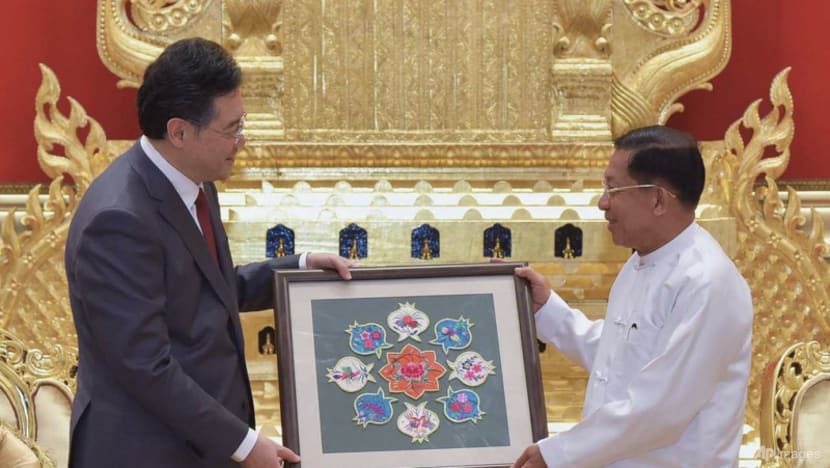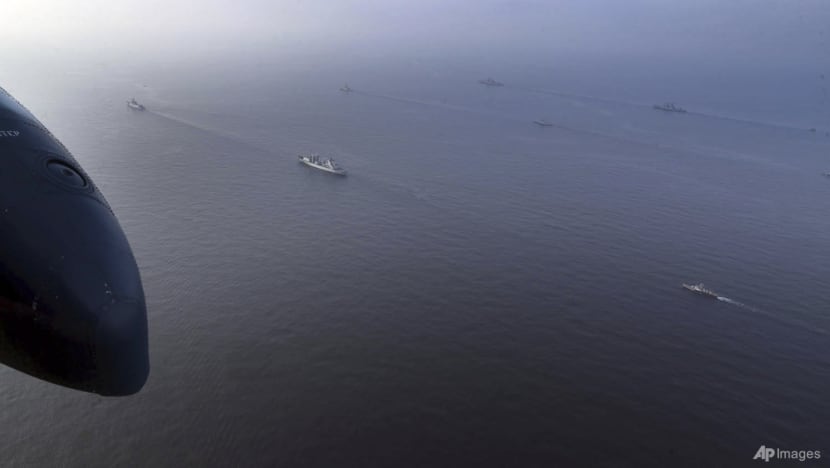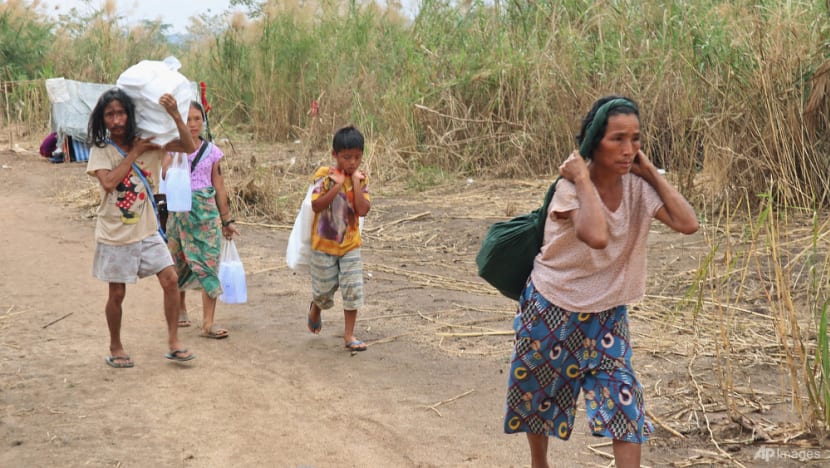China’s potential peacemaker role in Myanmar driven by economic, geopolitical interests; no end in sight for crisis
Since the coup occurred in February 2021, the world has looked to China for help and influence in addressing the crisis, given its close ties to Myanmar as a longstanding trade partner, said one expert.

SINGAPORE: As the world turns to China as a potential peacemaker in the Myanmar crisis, it needs to engage with the National Unity Government before any meaningful dialogue can occur, said experts.
Currently, it has not done so, and instead deepened its trade ties with the generals who seized power in a coup over two years ago, Dr Htwe Htwe Thein, associate professor of international business at Curtin University, said on Wednesday (May 3).
China's foreign minister Qin Gang had met Myanmar's military chief Min Aung Hlaing in Naypyidaw on Tuesday, and said that China "stands with Myanmar on the international stage".
The Southeast Asian country’s leaders have also ignored the call for humanitarian assistance to be sent to its people, many of whom have been displaced amid the violence.
Mr Alexander Matheou, regional director for the Asia Pacific in the International Federation of Red Cross and Red Crescent Societies (IFRC), said that in his meetings with Myanmar’s ministers last week, no guarantee was given for his organisation to access all parts of the country to provide aid.
CHINA AS PEACEMAKER
Since the coup occurred in February 2021, the world has looked to China for help and influence in addressing the crisis, given its close ties to Myanmar as a longstanding trade partner, said Dr Thein.
“China does have influence over the generals, so the world looked towards it. But now, China seems to have unfortunately stepped up its trade relationship with the Myanmar generals,” she told CNA’s Asia Now.
“And it has been a worry that would divide the world between rights respecting countries and autocracies.”
Dr Thein said that there is potential for China to play a role as peacemaker in the ongoing crisis, but certain conditions have to be met before any meaningful negotiations can take place.

“So we have to work with the Chinese and see if China can bring about peace. But when we say peace, you don't go and visit the country without a proper timeline,” she said.
“The first and formal request should be to cease violence (and) to release political prisoners. Only then can the peace talk meaningfully occur.”
This includes communicating equally and openly with the National Unity Government (NUG), which the Chinese have not done, outraging Myanmar’s civil society and activists, said Dr Thein.
“China's interest in Myanmar is more than just economics. I mean, economically, it has a big interest in Myanmar. It has twin pipelines that connect landlocked southern provinces to the Indian Ocean,” she said.
China has invested in twin oil and gas pipelines that run nearly 800km from Made island on Myanmar's west coast to Ruili, on the border of China's Yunnan province.
“But more than that, it has a geopolitical interest in Myanmar as well, in terms of access to the Indian Ocean,” said Dr Thein.

She added that what is happening in Myanmar should not be seen in isolation, but viewed as a regional issue with serious impacts for other countries, especially those in the Indian ocean region.
NO GUARANTEE OF HUMANITARIAN AID
China’s actions come as the agreed Five-Point Consensus remains at a deadlock two years after it was created, with violence continuing in the country.
The plan was adopted after leaders from the Association of Southeast Asian Nations (ASEAN) called for a special meeting with army chief Min Aung Hlaing in April 2021, where they agreed on an immediate cessation of violence and for humanitarian aid to be sent to the country.
Over 18 million people currently remain in need of assistance, with over 1.5 million people displaced and large parts of the country inaccessible to humanitarian organisations, said Mr Matheou.
He visited Myanmar last week to meet with new leaders of the Myanmar Red Cross, and also met with the nations’ ministers and reiterated the need for principled humanitarian assistance.
He shared that in those meetings, he did not receive a guarantee that his organisation would be given access to all parts of the country to provide aid, “because there are constraints on their ability to provide those assurances”.
“It's a country very prone to natural disasters. Even while I was there, there was a tornado that destroyed the nearby village (and) several people lost their lives,” Mr Matheou told CNA’s Asia First on Tuesday.
He noted that the World Health Organization (WHO) described Myanmar as “one of the worst places in the world to access healthcare”.
“Over the last two years, we've seen some things definitely get worse. There is an intensity of fighting in more parts of the country. Consequently, more people are displaced and it is harder to provide humanitarian assistance. So all of those factors exacerbate the vulnerability for people in Myanmar at the moment,” he said.

He said that in every country the IFRC operates in, Myanmar included, they are auxiliaries to the local authorities. “And at the same time, they're obliged to follow certain fundamental principles of humanity and neutrality, impartiality (and) independence.”
In times of conflict, those principles are challenged, as there is mistrust towards organisations like the IFRC, with questions over “where your office is located (and) who may be influencing you”, he said.
“All those factors may decide whether or not you can be accepted into communities to deliver humanitarian assistance,” said Mr Matheou.














